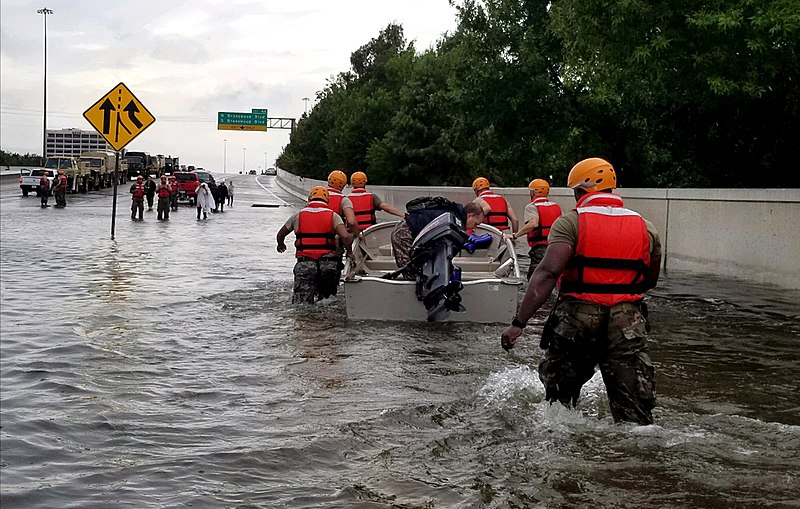 Image courtesy of Wikimedia.
Image courtesy of Wikimedia.
Hurricane Harvey has been declared the most intense rain event in U.S. history. Houston and surrounding areas experienced 50 inches of rain over four days. This historic flooding event has left at least 33 people dead, hundreds of thousands displaced, and entire communities without running water and electricity. And two nuclear reactors 90 miles from Houston were nearly overcome by flooding, and narrowly missed a direct hit by Harvey.
The same week, residents of Mumbai struggled to cope with the heaviest rainfall the city has seen in more than 15 years. Across the region, more than 1,200 people are feared dead and 40 million are estimated to have been affected by flooding in India, Nepal, and Bangladesh.
These record-breaking climate events provide evidence that ought to show the staunchest skeptic that climate change is real. Global warming is now helping to fuel deluges around the world. The fingerprint of climate change has been firmly identified in the observed global trend of increasing extreme precipitation. Global warming is amplifying the damage done by hurricanes, monsoons, and other extreme weather events.
It seems a cruel and grave joke that the new US administration denies climate change and as a result has taken steps to defund the Environmental Protection Agency, pull America out of the Global Climate Agreement, ditch the Clean Power Plan, and most recently, provide “energy subsidies” to two of the most environmentally dangerous and polluting forms of energy known to man—coal and nuclear.
A decision both baffling and logic defying, providing subsidies to nuclear and coal companies—essentially an industry bailout—allows these economically unviable energy sources to further degrade our environment and change our climate.
![]()
Despite being marketed as such, nuclear energy is not a source of clean or renewable energy. It is an incredibly dirty process from its uranium mining beginnings all the way to its radioactive nuclear waste end. It has always come with an exorbitant price tag. Westinghouse/Toshiba bankrupted in May of this year because of “nuclear cost overruns” at four nuclear reactors under construction in the Southeast region of the US. The construction of two of these reactors was finally canceled in July, but not before billions of dollars were invested and a corporation was bankrupted.
Other plans to build new reactors have been canceled, totaling sixteen cancellations for the year.
These are not alternative facts.
Even a report released last week by Department of Energy (DOE) Secretary Rick Perry echoes what energy experts have been saying for years—coal and nuclear power are no longer economically viable.
Of course, the report goes on to omit the growing threat of climate change, the health and climate benefits of renewable energy, and the enormous subsidies dying fossil fuel and nuclear power industries have received for decades.
However, the reality that nuclear and coal are economically dead industries doesn’t change anything for Trump and his administration—they are making plans to rescue the nuclear and coal industries with billions of taxpayer dollars.
Taxpayers who have lost everything and are trying to figure out how to rebuild their lives. Taxpayers whose communities have developed some form of cancer or chronic disease because of the nearby nuclear reactors or the radioactive waste dumped in their community. Taxpayers whose children suffer from asthma and other life-threatening conditions because of air pollution from fossil fuels. Taxpayers who are most vulnerable to climate change related weather events because of their geographic location. Taxpayers who need their money invested in renewable energy sources that would stymie climate change and not poison their communities.
Trump’s decision to waste billions of dollars subsidizing nuclear and coal corporations does not change the truth: climate change is real and we need to invest in renewable energy to slow down the process.
His short-sighted decision will undoubtedly exacerbate the rate at which our climate is changing and will have far-reaching effects in the most vulnerable populations among us, domestically and internationally.
As floodwaters recede and we support clean up and rebuilding efforts in Houston and Southeast Asia, keep in mind that catastrophic events like this are likely to become more frequent and increasingly more intense as our climate heats up. It is vital for us to use our collective voices to not allow this administration to lead us into the doldrums—to protect our communities, our environment, and the lives of future generations!
Please join NIRS in our campaign to Stop the Nuclear and Coal Bailout—
1. Sign our petition
2. Share it with your friends
3. Help us reach thousands more people



